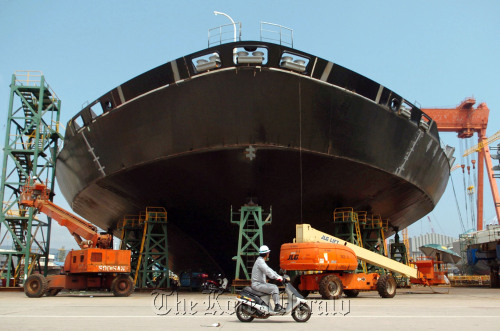Korean firms strive to tackle shortages of trained workers due to demographic change
A rapidly aging population poses a grave challenge to Korean manufacturers, which have seen a large number of skilled workers retire.
Hyundai Heavy Industries, the world’s largest shipyard, is suffering most from the trend. A record number of 950 reached retirement age last year. The numbers are estimated to be 800 this year and 930 next year. With the average age of employees reaching 44.8 years, Hyundai Heavy estimates the number retiring will exceed 1,000 per year through 2014.
The Ulsan-based firm however set an example to tackle the shortages ― with a program to hire retirees for an additional year.
A total of 766 of last year’s retirees chose to continue working under a labor-management agreement reached in 2008. They will work for 70 to 90 percent pay.
“At the time (of collective negotiations), the company and the union were in agreement over the need for such a measure,” a Hyundai Heavy official said. “It was considered beneficial by both the union and the company.”
A rapidly aging population poses a grave challenge to Korean manufacturers, which have seen a large number of skilled workers retire.
Hyundai Heavy Industries, the world’s largest shipyard, is suffering most from the trend. A record number of 950 reached retirement age last year. The numbers are estimated to be 800 this year and 930 next year. With the average age of employees reaching 44.8 years, Hyundai Heavy estimates the number retiring will exceed 1,000 per year through 2014.
The Ulsan-based firm however set an example to tackle the shortages ― with a program to hire retirees for an additional year.
A total of 766 of last year’s retirees chose to continue working under a labor-management agreement reached in 2008. They will work for 70 to 90 percent pay.
“At the time (of collective negotiations), the company and the union were in agreement over the need for such a measure,” a Hyundai Heavy official said. “It was considered beneficial by both the union and the company.”

In Korea, an increasingly large number of people are being pushed out of the workforce due to age. According to the Organization for Economic Development and Cooperation, Korea is aging at the fastest rate among its members, and will become a super-aged society, where more than 20 percent of the population is aged 65 or over by 2026.
Hyundai’s rehiring program was made possible by the company’s amicable labor-management relations. There were no strikes for the 16th year in 2010.
But the measure is far from a fundamental cure for the situation.
According to the company’s labor union, the number of workers employed in manufacturing positions fell from 17,000 in 2001 to about 14,000 by the end of 2010, including those who retired in that year.
Though the system helps slow the drop, the shipbuilder has seen the number of skilled workers fall by more than 2,000 in that period.
The union also is concerned about the slow addition of new employees. According to the union, the company hired new workers in late 2010 for the first time in more than 2 years.
The company, however, says that it has taken sufficient actions to balance the changes.
“The company has been hiring new workers, which contributes to restoration (of the workforce),” a Hyundai Heavy official said. “And while there is a perception that young people tend to avoid production positions, positions at the company are very popular with the young resulting in competition rates as high as 20 to 1.”
Hyundai Heavy is not alone in having introduced measures to slow the outflow of skilled workers.
According to Hyundai Motor Co.’s union, as the average age of its members is between 45 and 46 years, the number of retirees each year will soon reach 1,000.
The situation prompted the labor union to include establishing a joint team between it and management for developing solutions in its agenda for the quarterly labor-management conference on Jan. 13.
While the union’s suggestion concerning a taskforce does not appear to have taken off yet, Hyundai and Kia Motors Corp. have taken some measures to address the problem.
“Both Hyundai and Kia raised the retirement age to 59 in 2008 at the request of the unions,” a Hyundai official said.
“But the companies do not have peak wage systems in place, and provide guarantees that they can work until reaching retirement age.”
As a counter measure for the growing problem of an aging workforce the government introduced the peak wage system that extends the retirement age or guarantees employment until retirement at a lower pay in 2003.
However, the system has yet to catch on with only 9.2 percent of 8,423 businesses employing more than 100 people having taken up the system by the end of 2009, according to a recent Samsung Economic Research Institute’s paper.
Large companies that have adopted the system include the steelmaker POSCO, which agreed to raise the age from 56 to 58 from this year.
“Through the extension, employees have been made able to work for financial stability by securing employment in step with population aging,” POSCO said in an e-mailed statement.
“For the company, it secures highly-trained professionals needed for expansion of businesses including the construction of overseas steelworks, while the peak wage system helps cut labor costs freeing resources for hiring new workers.”
By Choi He-suk (cheesuk@heraldcorp.com)








![[Graphic News] More Koreans say they plan long-distance trips this year](http://res.heraldm.com/phpwas/restmb_idxmake.php?idx=644&simg=/content/image/2024/04/17/20240417050828_0.gif&u=)
![[KH Explains] Hyundai's full hybrid edge to pay off amid slow transition to pure EVs](http://res.heraldm.com/phpwas/restmb_idxmake.php?idx=644&simg=/content/image/2024/04/18/20240418050645_0.jpg&u=20240419100350)





![[From the Scene] Monks, Buddhists hail return of remains of Buddhas](http://res.heraldm.com/phpwas/restmb_idxmake.php?idx=652&simg=/content/image/2024/04/19/20240419050617_0.jpg&u=20240419175937)

![[KH Explains] Hyundai's full hybrid edge to pay off amid slow transition to pure EVs](http://res.heraldm.com/phpwas/restmb_idxmake.php?idx=652&simg=/content/image/2024/04/18/20240418050645_0.jpg&u=20240419100350)

![[Today’s K-pop] Illit drops debut single remix](http://res.heraldm.com/phpwas/restmb_idxmake.php?idx=642&simg=/content/image/2024/04/19/20240419050612_0.jpg&u=)